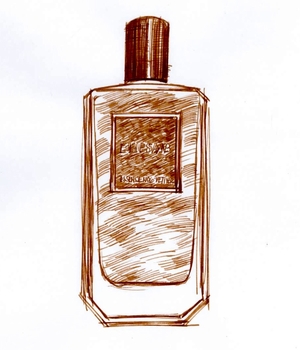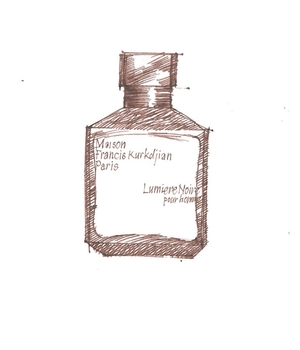Tagged With ‘Francis Kurkdjian’
Elie Saab
Essence No 6: Vetiver
29 November, 2015
 Is it just me, or would you be more impressed if a successful fashion designer decided not to do a perfume range than decided to do one? But there we are: perfume and fashion have gone together since the days of Paul Poiret, and you can’t blame Elie Saab from joining the crowd.
Is it just me, or would you be more impressed if a successful fashion designer decided not to do a perfume range than decided to do one? But there we are: perfume and fashion have gone together since the days of Paul Poiret, and you can’t blame Elie Saab from joining the crowd.
Actually perhaps that’s a bit unfair, as Saab’s new perfume, Essence No 6: Vetiver, is a really fine unisex fragrance, cleverly balancing the slightly damp earthiness of vetiver with the woody, floral scent of violet and herbal lavender.
There again maybe I shouldn’t have been surprised, as like all of Saab’s fragrances, Vetiver is the work of Francis Kurkdjian, who is now arguably the leading perfumer of his generation. French-born Kurkdjian sprang to fame at the age of 26 when he created Le Male for Jean-Paul Gaultier, and he has gone on to launch a stream of commercial hits, from Armani Mania to My Burberry. Yet he’s remained a highly creative perfumer, with his own excellently packaged Maison Francis Kurkdjian line.
In 2010 Saab signed a ten-year deal with Beauté Prestige International, one of the big perfume licensing companies (which in turn is owned by Shiseido), and the first Elie Saab perfume came out the following year. The Essences range was launched in August 2014, and Essence No6: Vetiver is the latest addition, along with Essence No7: Neroli (funnily enough there isn’t an Essence No5 in the range, presumably for Chanel-related reasons).
Vetiver has long been one of the most popular ingredients in perfumery, particularly in men’s perfumes. It’s not hard to understand why: the dried roots of this tropical grass have a wonderfully earthy, sexy, slightly bitter smell. You could probably use good-quality vetiver oil as a scent in its own right, but understandably enough, creative perfumers enjoy the challenge of combining it with other ingredients to bring out its specific qualities. In Guerlain’s classic Vétiver, for example, it’s combined with the lemony citrus smells you’d expect to find in a men’s cologne.
For Essence No6: Vetiver, perfumer Francis Kurkdjian has done something a bit different, by softening the earthy vetiver with the gentler, less abrasive scents of lavender, cloves, geranium and bergamot orange. Together they give Essence No6 a gentle touch of fruit, and even a hint of chocolate, though vetiver remains the star of the show. The result is deliciously rich and rounded, and you can really sense the quality of the ingredients. The chunky glass bottle, too, has an appealing weight to it, helped by the attractively unfussy, rather retro design, like a men’s after-shave from the 1930s. Perfect for wearing every day.
Francis Kurkdjian
Pluriel
14 July, 2014
Apologies for the recent radio silence: holidays followed by a family drama and so-far unsuccessful job-hunting. Normal service will (I hope) be renewed before long, but in the meantime I thought it might be an idea to do a quick recent-releases round-up of some perfumes I’ve kindly been sent in the last couple of months that don’t, I feel, merit a full review of their own.
I’ll start with PLURIEL, the latest men’s fragrance from the super-talented French-Armenian perfumer Francis Kurkdjian. Listening to him at the London launch I couldn’t help but like him: he speaks with such knowledge and passion, and he draws such interesting parallels between perfume and other kinds of artistry. His fragrances are excellently packaged too, with a nesting double box and a nicely proportioned bottle like a chamfered cube.
My problem is that his perfumes just don’t seem to suit me: I’ve tried them all so far and none of them appeal (see my review of Absolue Pour le Matin). The men’s version of Pluriel takes two of the main elements in male perfumery – the smells of lavender and wood – but Kurkdjian has given them a contemporary twist by using lavender absolute rather than lavender oil, and by mixing a number of different woody smells to create an impressionist ‘blur’ of woodiness. As he explains, lavender absolute has the same overall smell as lavender oil, but it has more depth; a bit like playing the same tune an octave lower.
It’s sophisticated perfumery, but while I admire Kurkdjian’s defence of synthetic ingredients, which he compares to Pantone colour charts for giving him a far greater range of effects than natural ingredients ever could, I think that, ironically, it’s precisely their synthetic smell that puts me off his fragrances.
As a professional perfumer with a long and successful industry career, he also says that he wants to create commercial scents: that makes good financial sense, especially for someone running his own relatively small business, but the downside (and again this is just how it seems to me) is that they can end up smelling like pretty much every other big-selling men’s perfume out there, which is how Pluriel smells to me. And given how much thought and care has gone into creating it, I think that’s a shame.
Francis Kurkdjian
Absolue Pour le Matin
27 May, 2014

I feel particularly bad about this because the guys at Maison Francis Kurkdjian have very kindly given me four of his men’s perfumes: Lumière Noire, Absolue Pour le Matin, Amyris and Aqua Universalis. The bottles they come in are terrific: chunky glass cubes, narrowly faceted at each corner and more broadly faceted above and below, with a weighty zinc cap and discreet gold lettering in a sharp serif font – the zinc, apparently, being a nod to the distinctive zinc roofs of Parisian apartment blocks. Even the packaging, which lots of buyers simply throw away (not realising that keeping your perfume in its box preserves it from the degrading effects of light) is smart and carefully thought through: a box that sits within a thicker box, its interior printed gold.
All admirable stuff, admirably executed too. Which is why it’s such a big disappointment that the contents don’t live up to the packaging, for me at any rate. Take Absolue Pour le Matin, which is the one I like the best (or more accurately, dislike the least). It’s a fairly fresh, lemony fragrance, which also contains iris and lavender, but it has a cloying, rather chemical character that lasts, and lasts, and lasts and makes me feel faintly ill. If it was a more unusual and original scent I guess I wouldn’t mind so much, or for that matter if it cost rather less than £115 for 70ml, but hey, there we are.
Yet Francis Kurkdjian is obviously a perfumer of talent and imagination. His first big success came in 1995 when, at the age of just 25, he created Jean-Paul Gaultier’s first men’s fragrance, Le Male. Among his other successes are Armani Mania (2002) and Narcisco Rodriguez’ For Her (2003) and For Him (2007). They’ve all been big sellers, but – and perhaps this is the clue to why I’ve had such trouble with his own perfumes – I don’t like the smell of any of them. I’m not saying they’re bad: I’m just saying they’re not, for one reason or another, my style of fragrances, though they obviously appeal to lots of other people.
For now, though, I’m going to keep trying, and I might review the other Kurkdjian fragrances in a while. In the meantime I’m hoping he releases a new perfume that I absolutely love.